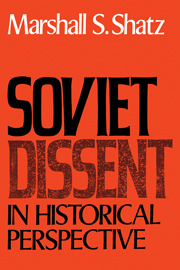Book contents
- Frontmatter
- Contents
- Preface
- 1 Introduction
- 2 The genesis of the Russian intelligentsia
- 3 The formation of a Russian intelligent
- 4 Reason and revolution
- 5 Khrushchev and the de-Stalinization campaign: the development of literary dissent
- 6 The Siniavsky–Daniel trial and its aftermath: legal tactics and organizational efforts
- 7 The Soviet dissidents
- 8 Programs and prospects
- Notes
- Select bibliography
- Index
6 - The Siniavsky–Daniel trial and its aftermath: legal tactics and organizational efforts
Published online by Cambridge University Press: 04 August 2010
- Frontmatter
- Contents
- Preface
- 1 Introduction
- 2 The genesis of the Russian intelligentsia
- 3 The formation of a Russian intelligent
- 4 Reason and revolution
- 5 Khrushchev and the de-Stalinization campaign: the development of literary dissent
- 6 The Siniavsky–Daniel trial and its aftermath: legal tactics and organizational efforts
- 7 The Soviet dissidents
- 8 Programs and prospects
- Notes
- Select bibliography
- Index
Summary
A “patient” in a special psychiatric hospital does not even enjoy the meagre rights of camp prisoners. He has no rights at all. The doctors can do what they want with him and no one interferes or comes to his defence. None of his complaints or the complaints of those who are with him will ever leave the hospital. His only hope is for an honest doctor.
… Although I have never had cause to regret my faith in the honesty of the doctors, I nevertheless insist – as I always have – that a system in which your only hope lies in the honesty of the doctors is worthless.
General Peter Grigorenko.The intimate relationship between politics and literature continued into the post-Khrushchev period. Not long after Khrushchev's deposition, yet another literary episode touched off a new phase of dissent in the Soviet Union. For several years two writers, Andrei Siniavsky and Iuly Daniel, had been smuggling their writings to the West and publishing them under the pseudonyms of Abram Tertz and Nikolai Arzhak respectively. Finally identified and arrested, they were brought to trial in February 1966.
- Type
- Chapter
- Information
- Soviet Dissent in Historical Perspective , pp. 117 - 137Publisher: Cambridge University PressPrint publication year: 1981



